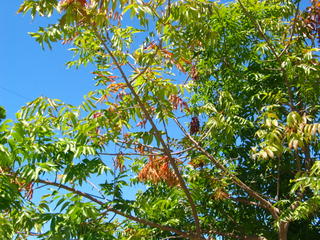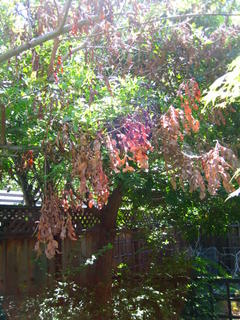 One of the Pistacia chinensis (Chinese pistache) trees planted in the parkway in front of our home has been in a bit of a slump. Last year it lost a few leaflets a little early; this year it's been losing a lot more — a lot earlier.
One of the Pistacia chinensis (Chinese pistache) trees planted in the parkway in front of our home has been in a bit of a slump. Last year it lost a few leaflets a little early; this year it's been losing a lot more — a lot earlier.At first I wondered whether maybe the tree was just a little stressed (aren't we all?). Then, I thought, maybe its roots were bumping into the remnants of the allelopathic Juglans nigra (black walnut) that used to live there; but that didn't make sense, because that tree was long gone even before it was taken out. Then I came across a diagnosis that, unfortunately, fits: verticillium wilt.
Now, I knew that Verticillium could be a problem here. Every nursery carries "VFN" tomatoes and strawberries, for instance, bred to resist Verticillium and Fusarium fungi and nematodes. And I've already had first-hand experience with Verticillium, which is steadily taking out one of our Schinus molle (Brazilian pepper)
 screening trees (even though the tree is putting up enough of a fight that every year I hope this might be the year it impersonates Lazarus). But come on now... our street trees?! That's just not fair.
screening trees (even though the tree is putting up enough of a fight that every year I hope this might be the year it impersonates Lazarus). But come on now... our street trees?! That's just not fair.This is the problem with urban soils: they have been so heavily used, and so poorly managed, over the years that there's just no telling what has taken up residence in them. Our neighborhood, for instance, used to be a pear orchard; so it's actually not surprising when our apples and pears (fruiting and ornamental alike) wither and brown from fireblight, or our strawberry plants turn to dust seemingly overnight from Verticillium.
Worst of all, there's little evidence on the surface as to what lurks below. Not 10 feet from our infected pepper tree, a patch of volunteered strawberries is thriving. And once the fungus is there, it's there to stay. That's why I decided to include soil testing among Verdance's suite of services, so we can know what to expect before we call for that specimen Aristocrat pear (or that all-important curtain of Schinus... darn).
I'll keep crossing my fingers that our pistache is simply stressed after all. But frankly, it's not the only one.
No comments:
Post a Comment